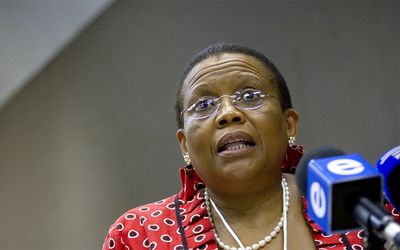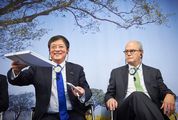STAFF at the Electoral Commission (IEC) are to meet management on Tuesday to discuss several workplace demands, amid continued pressure on the commission’s leadership a month before South Africans head to the polls.
At the weekend, workers affiliated to the National Education Health and Allied Workers Union (Nehawu) threatened to down tools, demanding the resignation of the IEC’s chairwoman, Pansy Tlakula.
IEC management will meet Nehawu leaders on Tuesday.
IEC deputy chairman Terry Tselane said on Monday the commission expected to resolve the disagreement amicably following a number of previous engagements.
The IEC did have a recognition agreement with Nehawu, but the union’s grievances were based on what power the union should have in bargaining, he said.
Previously the commission, lacking a union, had relied upon increases reached in the Public Service Co-ordinating Bargaining Council, but Nehawu wanted negotiation on issues such as working conditions or salary increments, he said.
Mr Tselane said the negotiations would not disrupt preparations for the elections.
"We are dealing with people who are highly committed to the credibility and functioning of the commission," he said.
Ms Tlakula has until Wednesday to respond to political parties demanding that she resign in the wake of the findings of probes into the leasing of the IEC’s head office in Centurion.
The two investigations, one initiated by the Treasury and the other conducted by Public Protector Thuli Madonsela, found that the procurement of the new headquarters in Centurion had not been transparent or cost effective.
The IEC is a chapter 9 institution and is designated an essential service by the Electoral Act.
Nehawu spokesman Sizwe Pamla said the meeting on Tuesday would deal with concerns of staff, including the failure to recognise the union, which represents about 75% of the commission’s 800 employees.
"They are trying to avoid unionisation of staff," said Mr Pamla.
Nehawu is demanding a car allowance for members who use their own vehicles, despite the IEC providing a pool of vehicles.
But Mr Pamla ruled out a strike for the moment, saying that Nehawu "will not be sending our members to the streets" to demand Ms Tlakula’s resignation. Such strike action could be seen as undermining the role of Parliament, to which the commission had to account, he said.

UNDER FIRE: Electoral Commission chairwoman Pansy Tlakula has been called on to resign by several opposition parties following the findings of two probes into a lease for IEC headquarters. Picture: THE TIMES
STAFF at the Electoral Commission (IEC) are to meet management on Tuesday to discuss several workplace demands, amid continued pressure on the commission’s leadership a month before South Africans head to the polls.
At the weekend, workers affiliated to the National Education Health and Allied Workers Union (Nehawu) threatened to down tools, demanding the resignation of the IEC’s chairwoman, Pansy Tlakula.
IEC management will meet Nehawu leaders on Tuesday.
IEC deputy chairman Terry Tselane said on Monday the commission expected to resolve the disagreement amicably following a number of previous engagements.
The IEC did have a recognition agreement with Nehawu, but the union’s grievances were based on what power the union should have in bargaining, he said.
Previously the commission, lacking a union, had relied upon increases reached in the Public Service Co-ordinating Bargaining Council, but Nehawu wanted negotiation on issues such as working conditions or salary increments, he said.
Mr Tselane said the negotiations would not disrupt preparations for the elections.
"We are dealing with people who are highly committed to the credibility and functioning of the commission," he said.
Ms Tlakula has until Wednesday to respond to political parties demanding that she resign in the wake of the findings of probes into the leasing of the IEC’s head office in Centurion.
The two investigations, one initiated by the Treasury and the other conducted by Public Protector Thuli Madonsela, found that the procurement of the new headquarters in Centurion had not been transparent or cost effective.
The IEC is a chapter 9 institution and is designated an essential service by the Electoral Act.
Nehawu spokesman Sizwe Pamla said the meeting on Tuesday would deal with concerns of staff, including the failure to recognise the union, which represents about 75% of the commission’s 800 employees.
"They are trying to avoid unionisation of staff," said Mr Pamla.
Nehawu is demanding a car allowance for members who use their own vehicles, despite the IEC providing a pool of vehicles.
But Mr Pamla ruled out a strike for the moment, saying that Nehawu "will not be sending our members to the streets" to demand Ms Tlakula’s resignation. Such strike action could be seen as undermining the role of Parliament, to which the commission had to account, he said.























Change: -0.47%
Change: -0.57%
Change: -1.76%
Change: -0.34%
Change: 0.02%
Data supplied by Profile Data
Change: -1.23%
Change: -0.37%
Change: -0.47%
Change: 0.00%
Change: -0.42%
Data supplied by Profile Data
Change: 1.39%
Change: 1.52%
Change: 1.24%
Change: 1.25%
Change: 1.17%
Data supplied by Profile Data
Change: 0.11%
Change: -0.52%
Change: 0.20%
Change: -1.38%
Change: -1.73%
Data supplied by Profile Data